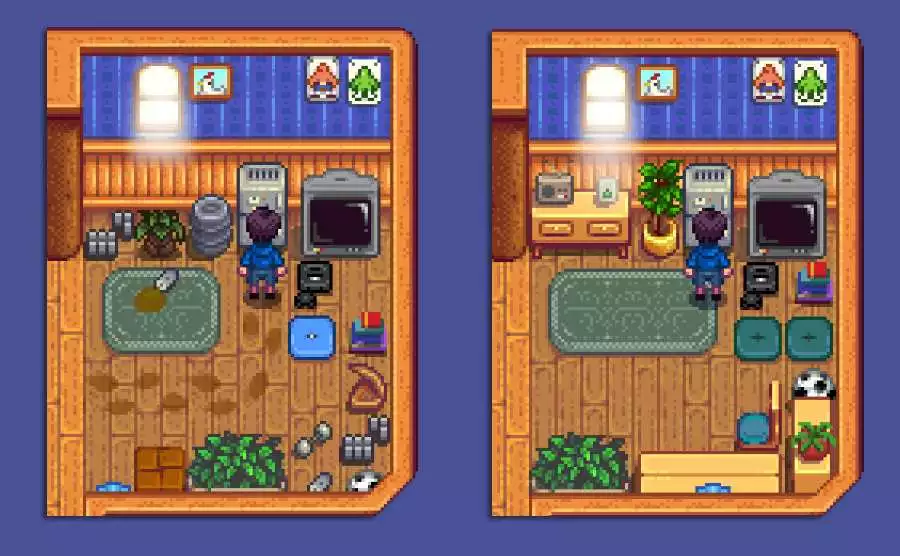In Stardew Valley, a pixelated utopia where users may produce crops, make friendships, and discover the stories of its citizens, an odd sight regularly attracts notice. This odd sight is Shane’s perpetually disorganized room.
This apparently trivial detail has more narrative significance than it initially seems to, allowing players to better understand the many facets of Shane’s persona. Shane is a multifaceted individual who lives in the town and battles his own inner problems, such as despair and a pervasive sense of disappointment.
His disorganized flat is a visual depiction of his internal issues, mirroring the disordered emotions and ideas that fill his mind. Through this storyline idea, Stardew Valley entices players to delve deeper and take part in Shane’s journey by telling a poignant tale of individual development and compassionate connection with others. Here is our guide on Why is Shane not cleaning room (Stardew Valley).
Why is Shane not cleaning room (Stardew Valley)

Procrastination and the avoidance of obligations are widespread human behaviors, and they frequently lead others who watch them to experience feelings of irritation and uncertainty. In the example of Shane and his unwillingness to clean his room, there might be a wide variety of underlying factors contributing to his behavior.
These reasons could include anything from laziness to anxiety or depression. This article will explore the reasons why Shane doesn’t clean his room and will throw light on the psychological, environmental, and personal elements that may be affecting his actions. The essay’s goal is to investigate the probable causes for Shane’s avoidance of cleaning his room.
Avoidance of Work
The human mind frequently compels people to avoid undertaking things that are perceived as being too difficult or too unpleasant. Depending on the condition of the room, cleaning it might be a challenging undertaking. Shane may be putting it off because he believes it will take too much work and too much time.
Perfectionism
It’s possible that Shane is suffering from perfectionist tendencies, and he’s afraid that he won’t be able to clean his room to the level of cleanliness that he expects for himself. This anxiety over performing an inadequate job can prevent him from ever beginning the assignment in the first place.
Decision Fatigue
The act of cleaning requires the cleaner to make a number of judgments, including where to store stuff, what to retain, and what to throw away. After some period of time, decision fatigue might set in, making the work appear mentally taxing and leading to avoidance of its completion.
Cluttered Environment
Ironically, a messy space might make it more difficult to motivate oneself to clean it. Shane may have a tough time simply getting started on organising and cleaning due to the sheer quantity of clutter that is present.
Lack of Routine
A routine that is not consistent might result in the failure to complete certain duties. It is possible that Shane’s room may get increasingly untidy over time if he does not maintain a regular cleaning routine. This will make the work even more challenging.
Lack of Motivation
A lackluster atmosphere has the potential to stifle motivation. If Shane’s room does not have any features that make him want to spend time in it, then it is possible that he will not feel driven to clean it.
Time Management
It’s possible that Shane has trouble managing his time well, which is why he won’t tidy his room. If he is consistently short on time, it is possible that he may put off cleaning until a later time.
Prioritization
Depending on the other obligations and interests that Shane has, it’s possible that cleaning his room won’t be at the top of his list of priorities. Because of this, he may put off completing his tasks in favor of engaging in other pursuits.
Responsibility Aversion
There are certain people who have difficulty accepting responsibility for their immediate environment. It’s possible that Shane doesn’t have a strong sense of ownership over his living environment, which, in turn, decreases his incentive to keep it in good condition.
Emotional State
A person’s level of psychological health can have a major influence on their level of drive to finish activities. It’s possible that Shane is avoiding cleaning his room because he’s feeling anxious, stressed out, or depressed because of these feelings; it’s a possibility.
Fix: Why is Shane not cleaning room
This article will explore practical strategies and effective solutions to help Shane overcome his room cleaning hurdle and achieve a clutter-free and organized environment.
Method 1: Set Manageable Goals
Shane may make smaller, more manageable goals rather than trying to handle the whole area at once. For instance, start by cleaning up his closet or organizing his workspace. These mini-tasks are more manageable and might give him a sense of success that spurs him to keep going.
Method 2: Declutter and Prioritize
Encourage Shane to organize his space by getting rid of things he doesn’t use or need. Setting priorities might help you make more space and simplify cleaning.
Method 3: Create a Cleaning Schedule
Setting up a regular cleaning schedule might be really beneficial. In order to make cleaning a regular part of his routine, Shane can set up a particular day and time each week.
Method 4: Use the “Two-Minute Rule
Encourage Shane to finish whatever that has to be done in under two minutes. This straightforward guideline helps stop little tasks from building up and adding to the general clutter.
Method 5: Enlist Help
You don’t have to perform the cleaning alone. Shane might ask his roommates, family members, or friends to participate. The companionship of others can occasionally make an activity more fun and effective.
Method 6: Breaks and Rewards
Suggestion: Tell Shane to set a timer, clean for the allotted amount of time, then take a little rest. Having a reward system, such as a snack or a little film to watch during breaks, may break up the monotony of cleaning.
Method 7: Visualize the End Result
Ask Shane to imagine what his room will feel and look like once it has been cleaned and organized. This mental picture might act as a strong starting motivation.
Method 8: Implement the “One In, One Out” Rule
Encourage Shane to take out one item he no longer needs each time he adds anything new. This guideline keeps everything in check and stops clutter from building up.
Method 9: Design a Functional Layout
Shane might not appreciate being in his room if it isn’t useful. The room may be made more welcoming by rearranging the furniture to improve space and flow, which will encourage you to keep it tidy.
Method 10: Celebrate Progress
Reward Shane for his contributions, no matter how minor. Celebrating his successes might help him feel more confident and less like the cleaning process is a burden.
Follow us on Twitter & like our Facebook page for more post-updates.
-
-
Can you combine CC and Joja Route in Stardew Valley Expanded
-
Does Joja Route affect your Relationship with Caroline and Family in Stardew Valley

An experienced gaming content writer who emphasizes on offering the most recent information and how-to tutorials for the trending titles. Being a Hardcore gamer himself, he likes to try an array of games and likes to spend his time exploring them. He likes to unwind by listening to R&B music when he’s not writing about gaming stuff.


